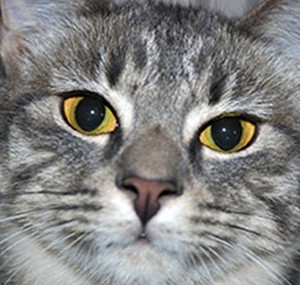Overview
Gastroenteritis is inflammation of the stomach and intestines, and is a common cause of vomiting and diarrhea. There are many causes of gastroenteritis.
These include:
- Dietary indiscretion, which refers to eating inappropriate things garbage/food scraps, or foreign material such as string or tinsel
- Hairballs, also very common
- Changes in diet
- Parasitic infection
- Food allergies
- Viral infection
- Bacterial infection
- Obstruction
- Kidney disease
- Liver disease
- Diabetes
- Feline pancreatitis
- Inflammatory bowel disease
- Stress
- Cancer
Risk/Signs
Any cat may develop gastroenteritis, which may be mild and self limiting or, in some cases, result in severe vomiting and diarrhea, (occasionally with blood) leading to decreased appetite, dehydration and an electrolyte imbalance. Contact your veterinarian immediately if vomiting and diarrhea are frequent or severe.
Diagnosis/Treatment
Because there are so many causes of gastroenteritis, be sure to provide your veterinarian with a thorough history of your cat, including answers to the following:
- Symptoms?
- Any prior medical problems or medications
- Exposure to other cats (such as going to the groomer or daycare)?
- Unsupervised access to your yard?
- Changes in cat food?
- Ingestion of foreign objects?
- Ingestion of garbage or people food?

To determine the underlying cause your veterinarian may recommend a combination of the following tests:
- Chemistry tests to evaluate for kidney, liver, and pancreatic function as well as sugar levels
- A complete blood count to evaluate inflammation, infection, anemia, and other blood-related conditions
- Electrolyte tests to ensure your cat is neither dehydrated nor suffering from an electrolyte imbalance
- X-rays of the abdomen to evaluate for foreign material and/or obstruction of the GI tract
- Ultrasound imaging of your cat’s digestive tract and other major abdominal organs
- Endoscopy to evaluate the lining of the stomach and intestinal tract and obtain biopsies for definitive diagnosis
- Specific tests to rule out viral infections, such as feline leukemia and feline immunodeficiency virus
- Fecal tests to identify if fecal parasites could be the cause
- Special fecal tests, such as cultures and polymerase chain reaction (PCR) testing
Cats with gastroenteritis, regardless of the cause, are often dehydrated and may need to be given fluids under the skin (subcutaneously) or directly into a vein (intravenously). Depending on the severity, your pet may be hospitalized to get the diarrhea and vomiting under control. In less severe cases, your veterinarian may recommend feeding a bland diet along with medications and instructions on how to care for your friend at home. It is very important that you carefully follow the treatment instructions from your veterinarian.
Prevention
To prevent or minimize the risk of gastroenteritis in your cat feed an appropriate diet, avoid exposure to table scraps, garbage, or foreign bodies, stay current on monthly broad spectrum parasite preventative, and avoid exposure to sick cats.
If you have any questions or concerns, you should always visit or call your veterinarian – they are your best resource to ensure the health and well-being of your pets.
